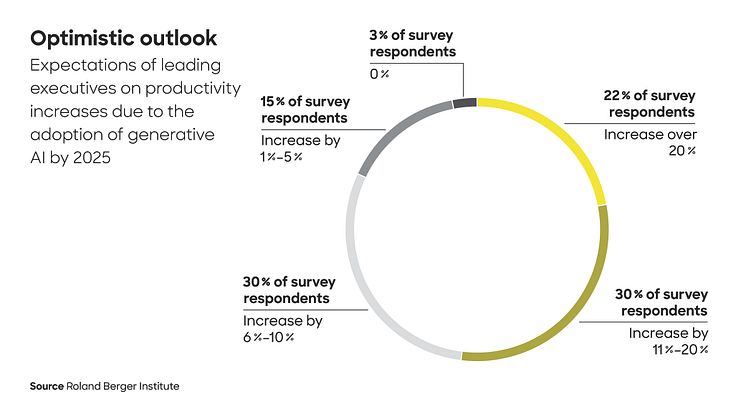
Press release -
Executives expect increase in productivity with generative AI
- At 82 percent, the large majority of executives believe that productivity gains of up to six per cent until 2025 are achievable – more than a fifth even believe that productivity gains of up to 20 percent are possible
- AI solutions help to create completely new products, services and professions
- Three steps to implementing generative AI
Munich, November 2023: Expectations are particularly high for generative AI – it is seen as the answer to the productivity crisis in highly developed economies. For managers, this hope is not unfounded, as the current Roland Berger study, "The new productivity booster", shows. The analysis is based on a global quantitative survey of 100 managers and a series of qualitative interviews.
"In contrast to previous upheavals, the current leap forward in the development of generative AI primarily affects knowledge workers in highly developed economies. In these economies, the shortage of skilled labor and demographic change are stunting productivity growth. AI can be an important driver for greater efficiency and innovation here," says Hasmeet Kaur, Global Managing Director at Roland Berger.
More productivity - but not fewer jobs
82 percent of respondents believe that a productivity increase of at least six percent is realistic through corresponding AI models. More than a fifth even expect leaps of up to 20 percent. In addition, over half of the participants do not expect any change in the number of employees.
"With the help of generative AI, new products, services and job profiles will emerge in the future. From AI bots as personal banking advisors to an improved shopping experience, companies in a wide range of industries can tap into growth potential," says Jochen Ditsche, Global Head of the Digital platform at Roland Berger. Looking forward, this will require experts such as prompt engineers who operate AI models for optimal results, as well as IT specialists who train them with data.
Major differences between the individual sectors
These growth opportunities are also reflected in investor behavior. According to an analysis by venture capital firm Atomico, 35 percent of AI financing in Europe is now flowing into generative AI projects – compared to just five percent in the previous year.
According to the Roland Berger survey, 47 percent of companies are already using ChatGPT, Dall-2 & Co with major distinctions between individual sectors: While retail (71%), the communications sector (67%), scientific institutions (63%) and the service sector (57%) use generative AI, the financial sector (29%), cultural institutions (25%) and, above all, manufacturing (14%) are reluctant.
Implementation in three steps
The integration of AI into existing business processes is possible in three steps. With an AI impact analysis, companies can identify suitable areas of application in their value chain and can use this as a basis for analyzing process data and defining an AI strategy. The third step involves implementing a proof of concept and initial use cases.
"Experience shows that companies can start to gradually implement a specific AI solution in around four months – a comparatively short period of time given the positive impact the technology can have on productivity," says Kaur.
Topics
Categories
Roland Berger is the only management consultancy of European heritage with a strong international footprint. As an independent firm, solely owned by our Partners, we operate 51 offices in all major markets. Our 3000 employees offer a unique combination of an analytical approach and an empathic attitude. Driven by our values of entrepreneurship, excellence and empathy, we at Roland Berger are convinced that the world needs a new sustainable paradigm that takes the entire value cycle into account. Working in cross-competence teams across all relevant industries and business functions, we provide the best expertise to meet the profound challenges of today and tomorrow.




